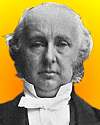 (source)
(source)
|
Benjamin Jowett
(15 Apr 1817 - 10 Jan 1893)
English theologian and Greek scholar known for his translation of The Dialogues of Plato, and for initiating the influential movement known as Oxford idealism.
|
Science Quotes by Benjamin Jowett (9 quotes)
Don’t spare; don’t drudge.
— Benjamin Jowett
Maxim quoted, without citation, in William Ian Beardmore Beveridge, The Art of Scientific Investigation (1950), 148.
Doubt comes in at the window, when Inquiry is denied at the door.
— Benjamin Jowett
In 'On the Interpretation of Scripture', Essays and Reviews (1860), 373.
Learn just enough of the subject [metaphysics] to enable your mind to get rid of it.
— Benjamin Jowett
As quoted in Geoffrey Madan’s Notebooks: A Selection (1984), 61.
Learning obscures as well as illustrates; it heaps up chaff when there is no more wheat.
— Benjamin Jowett
In 'On the Interpretation of Scripture', Essays and Reviews (1860), 337.
Logic is neither a science nor an art, but a dodge.
— Benjamin Jowett
Quoted in Evelyn Abbott and Lewis Campbell, The Life and Letters of Benjamin Jowett, M.A., Master of Balliol College, Oxford (1897), Vol. 1, 131.
One man is as good as another until he has written a book.
— Benjamin Jowett
In Evelyn Abbott and Lewis Campbell (eds.), The Letters of Benjamin Jowett (1897), Vol. 1, 248.
Research! A mere excuse for idleness; it has never achieved, and will never achieve any results of the slightest value.
— Benjamin Jowett
As quoted from author’s conversation with Jowett, in Logan Pearsall Smith, Unforgotten Years (1938, 1939), 186-187.
The metaphysical philosopher from his point of view recognizes mathematics as an instrument of education, which strengthens the power of attention, develops the sense of order and the faculty of construction, and enables the mind to grasp under the simple formulae the quantitative differences of physical phenomena.
— Benjamin Jowett
In Dialogues of Plato (1897), Vol. 2, 78.
We have sought truth, and sometimes perhaps found it. But have we had any fun?
— Benjamin Jowett
As quoted in Geoffrey Madan’s Notebooks: A Selection (1984), 61.
Quotes by others about Benjamin Jowett (2)
That ability to impart knowledge … what does it consist of? … a deep belief in the interest and importance of the thing taught, a concern about it amounting to a sort of passion. A man who knows a subject thoroughly, a man so soaked in it that he eats it, sleeps it and dreams it—this man can always teach it with success, no matter how little he knows of technical pedagogy. That is because there is enthusiasm in him, and because enthusiasm is almost as contagious as fear or the barber’s itch. An enthusiast is willing to go to any trouble to impart the glad news bubbling within him. He thinks that it is important and valuable for to know; given the slightest glow of interest in a pupil to start with, he will fan that glow to a flame. No hollow formalism cripples him and slows him down. He drags his best pupils along as fast as they can go, and he is so full of the thing that he never tires of expounding its elements to the dullest.
This passion, so unordered and yet so potent, explains the capacity for teaching that one frequently observes in scientific men of high attainments in their specialties—for example, Huxley, Ostwald, Karl Ludwig, Virchow, Billroth, Jowett, William G. Sumner, Halsted and Osler—men who knew nothing whatever about the so-called science of pedagogy, and would have derided its alleged principles if they had heard them stated.
This passion, so unordered and yet so potent, explains the capacity for teaching that one frequently observes in scientific men of high attainments in their specialties—for example, Huxley, Ostwald, Karl Ludwig, Virchow, Billroth, Jowett, William G. Sumner, Halsted and Osler—men who knew nothing whatever about the so-called science of pedagogy, and would have derided its alleged principles if they had heard them stated.
In Prejudices: third series (1922), 241-2.
For a longer excerpt, see H.L. Mencken on Teaching, Enthusiasm and Pedagogy.
For a longer excerpt, see H.L. Mencken on Teaching, Enthusiasm and Pedagogy.
Let U = the University, G = Greek, and P = Professor, Then GP = Greek Professor; let this be reduced to its lowest terms and call the result J.
From an essay concerning the Regius Professorship of Greek, The New Method of Evaluating as Applied to π (1865), as quoted and cited in Stuart Dodgson Collingwood, The Life and Letters of Lewis Carroll (1898), 159. Collingwood explains parenthetically, after "result J", “[i.e., Jowett]”, which was not in the original publication of “The New Method…”.
 In science it often happens that scientists say, 'You know that's a really good argument; my position is mistaken,' and then they would actually change their minds and you never hear that old view from them again. They really do it. It doesn't happen as often as it should, because scientists are human and change is sometimes painful. But it happens every day. I cannot recall the last time something like that happened in politics or religion.
(1987) --
In science it often happens that scientists say, 'You know that's a really good argument; my position is mistaken,' and then they would actually change their minds and you never hear that old view from them again. They really do it. It doesn't happen as often as it should, because scientists are human and change is sometimes painful. But it happens every day. I cannot recall the last time something like that happened in politics or religion.
(1987) -- 


